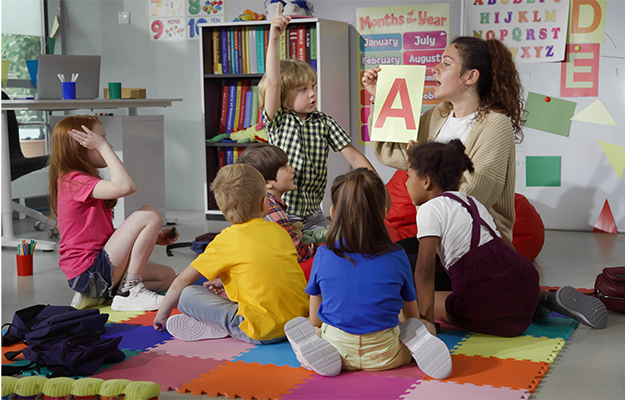Universal Pre-K Expansion in Chicago: An Update for 2023-24
Report indicates universal pre-K expansion is providing new seats where they are most needed
Get all our news

Over the 2018–19 school year, Chicago began expanding free, full-day prekindergarten (pre-K) for 3- and 4-year-olds through Chicago Public Schools (CPS). How has the expansion fared in 2023–24?
To answer that question, IPR developmental psychologist Terri Sabol and IPR economist Diane Whitmore Schanzenbach released a new report, "The Chicago Universal Pre-K Study: The Impact of Chicago’s Universal Prekindergarten Expansion on Access to School-Based Pre-K, 2023–24 Update," that includes data from this school year. In it, the researchers consider the impact of the expansion of universal pre-K (UPK) on capacity, enrollment, and full-day versus half-day programming in CPS schools.
As intended, schools that first expanded in 2018–19 and 2019–20 are located in neighborhoods with substantially higher poverty rates than schools expanding in 2022–23 and 2023–24. For example, in participating schools in 2018–19, the expansion's first year, the average percentage of families in the school’s neighborhood considered to be living in poverty was 14%, compared with just 3% for schools that expanded in the last two years. In addition, early expansion schools served more Black and Hispanic/Latinx students and fewer White students.
In terms of capacity, the Chicago UPK expansion substantially increased the number of available, free, full-day seats in CPS for 3- and 4-year-olds across all CPS schools in the city. By 2023–24, CPS had 15,862 free, full-day pre-K seats—almost twice the number from 2017–18, the year before the expansion started.
Across all CPS schools, the number of free pre-K seats also increased from one-third before the expansion started in 2017–18 to two-thirds in 2023–24. That growth is more pronounced when looking at only UPK expansion schools, where the number of free, full-day seats grew from less than 10% (1,633 seats) in 2017–18 to more than 70% (10,850 seats) in 2023–24. Their study also shows how the expansion affected pre-K capacity within each participating school. In those, the number of free, full-day pre-K seats grew, on average, from only eight seats prior to more than 48 seats by 2023–24 for a total of 56 available seats per school.
Perhaps more important, their research shows a "substantial increase" in the number of 3- and 4-year-old children who enrolled in pre-K. Enrollment jumped in the first year after the expansion from 7,122 to 10,934, dipped during the height of COVID-19 pandemic in 2020–21 to 7,677, and then rebounded in 2021–22 to 10,884 students across the district and 7,653 students in expansion schools. In 2023–24, district enrollment hit 77%, with pre-K students enrolled in 12,225 spots out of a total of 15,862 available.
Most of the full-day expansion, however, was offset by declines in half-day seats, from 7,655 in 2018–19, the first year of the expansion, to 7,120 by 2023–24, the latest year. Since 2021–22, total capacity has stabilized while total enrollment has increased. The results show more open seats in more economically disadvantaged communities on the city’s South and West Sides. This, according to the researchers, indicates that the UPK expansion is working as intended, providing new seats where they are most needed.
In sum, the research continues to show that UPK has increased both the number of available free, full-day pre-K slots and enrollment in CPS schools for 3- and 4-year-olds. Though Chicago now has fewer pre-K aged children overall, a growing number of them are attending free pre-K in CPS due to increased enrollment in free, full-day pre-K.
"This means that more parents have access to free prekindergarten, reducing the economic burden that many families face when paying for childcare," Sabol said.
The report covers the following topics:
- Overview of the Chicago Universal Prekindergarten model
- The pre-K landscape in CPS before the universal pre-K expansion
- Citywide patterns in pre-K capacity, enrollment, and full-day vs. half-day seats
- Chicago universal pre-K expansion leads to increased enrollment for 3- and 4-year-olds
- An increase in full-day seats is accompanied by a decrease in half-day seats
- Within-school analysis: The impact of universal pre-K expansion on capacity, enrollment, and full-day vs. half-day seats
- Chicago universal pre-K expansion leads to increased enrollment of 3- and 4-year-olds in CPS schools
- The capacity for additional pre-K enrollment across the city
- As pre-K enrollment increases, kindergarten enrollment decreases
Terri Sabol is associate professor of human development and social policy. Diane Whitmore Schanzenbach is the Margaret Walker Alexander Professor. Both are IPR fellows.
Photo credit: iStockphoto
Published: December 21, 2023.


